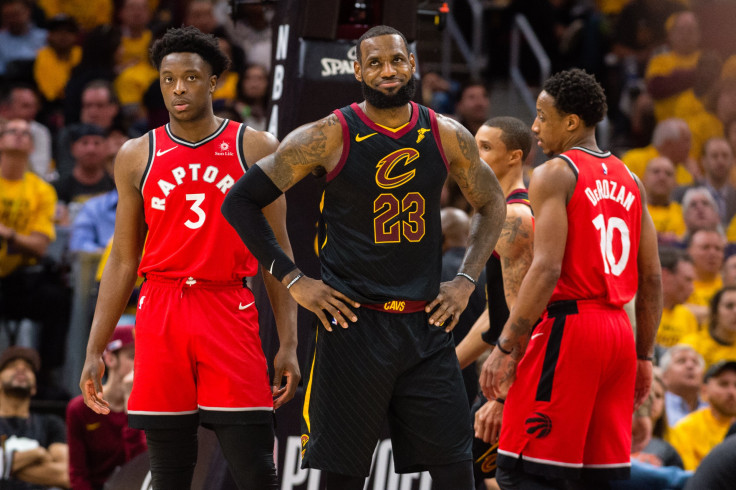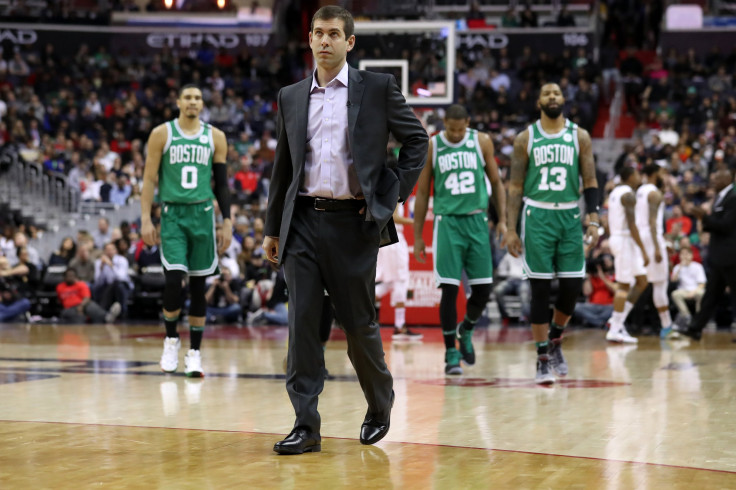Cavaliers vs. Celtics Prediction: Can Boston Stop LeBron James, Cleveland From Reaching The 2018 NBA Finals?

The impending rematch between the Cleveland Cavaliers and Boston Celtics in the 2018 Eastern Conference Finals was both predictable and improbable at the same time. It’s the series everyone expected to see when the two teams swapped Kyrie Irving and Isaiah Thomas last summer, though the odds were against it happening when the playoffs began.
Yet here we are, a month after the start of the postseason, and the East’s representative in the NBA Finals will come down to Cleveland or Boston for a second straight year.
Both Irving and Gordon Hayward—Boston’s two offseason additions that were supposed to help them challenge Cleveland—will miss the series because of injuries. Thomas played just 15 games with the Cavs before it became clear that he wouldn’t come close to replacing Irving as part of the team’s “Big 3,” and Cleveland shipped the point guard to Los Angeles for role players that likely won’t have much of an impact on this series.
After both teams needed seven games to get out of the first round, the Celtics were significant underdogs against the Philadelphia 76ers and the Cavaliers were nearly a 2/1 underdog against the 59-win Toronto Raptors. Boston and Cleveland went a combined 8-1 in the conference semifinals.
Despite weakened rosters, the Celtics and Cavs are back in the conference finals.
How Boston Got Here
For Boston, the answer lies in terrific performances from its young core. That’s not supposed to happen in the playoffs, where inexperience often rears its ugly head.
Just look at Rookie of the Year favorite Ben Simmons, whose costly turnovers and lack of aggression hurt Philadelphia greatly. Joel Embiid had his own issues in his first postseason with the 76ers. Likely Rookie of the Year runner-up Donovan Mitchell was erratic with more shot attempts than points in Utah’s second-round loss to the Houston Rockets.
You wouldn’t have a clue that Jayson Tatum was a rookie by watching him in the playoffs, where he’s led Boston with 18.8 points per game. The No.3 overall pick in last year’s draft was the catalyst on offense in the Celtics’ five games against the 76ers, scoring at least 20 points in each contest while shooting 52.6 percent from the field.
Second-year player Jaylen Brown is younger than both Simmons and Mitchell, and he played just 12.6 minutes per game in the 2017 playoffs. He was Boston’s leading scorer in the first round against the Milwaukee Bucks and scored 24 points on 10-13 shooting in Wednesday’s clincher.
Terry Rozier might be the biggest surprise for Boston. The 24-year-old seamlessly transitioned from Irving’s backup into the Celtics’ starting point guard, leading the team with 5.8 assists per game and ranking second with 18.2 points per game this postseason. Rozier entered the first round with no postseason starts and a career playoff average of 5.4 points per game.
Veteran Al Horford has been the glue that’s held the team together. He’s arguably been the Celtics’ best player this postseason with averages of 17.0 points and 8.7 rebounds per game, playing exceptional defense against multiple positions.
On any other team, Boston’s top players might not be able to sustain this kind of production. But they play for Brad Stevens, arguably the league’s best head coach, and he keeps finding ways to make this roster successful.
“Man, I can’t believe these guys are winning. To beat Milwaukee, now to beat the Sixers—this guy (Stevens), the way he plugs guys in gives them total confidence,” Charles Barkley said on TNT’s “Inside the NBA” Wednesday night.
“If the general don’t panic, the troops won’t panic. Every time they show Brad Stevens on the sidelines, you can’t tell if he’s winning or losing. It’s remarkable.”

How Cleveland Got Here
This was supposed to be the year that LeBron James could finally get eliminated early in the playoffs. That became the conventional wisdom when Cleveland entered the playoffs as the East’s No.4 seed—James’ worst regular-season finish in a decade—and with the conference’s worst defense. It even looked like the Cavs might not get past the first round when the Indiana Pacers took them to seven games.
James, however, wouldn’t let his team bow out early. He dragged the Cavs to the conference semifinals with a historic first round, registering three 40-plus point games, a triple-double and a game-winning buzzer-beater.
The performance of James’ supporting cast didn’t inspire much confidence in Cleveland’s chances against Toronto, but the rest of the Cavs showed up for a four-game sweep of Toronto. Kyle Korver averaged 14.5 points on 56.0 percent shooting from three-point range, and JR Smith got hot with 10 makes on 13 three-point attempts.
Most importantly, Kevin Love played like the secondary scorer that James needed. He raised his averages from 11.4 points, 9.3 rebounds and 33.3 percent shooting in the first round to 20.5 points, 11.5 rebounds and 47.5 percent shooting in the second round.
Of course, it starts and ends with James, who is somehow playing the best basketball of his career. After crushing Toronto’s soul for a third straight year—this time with a four-game sweep that included a historic Game 2 shooting display and a Game 3 game-winner—James has 2018 playoff averages of 34.3 points, 9.4 rebounds and 9.0 assists per game while shooting 55.3 percent from the field. He might just be too good to beat.
“He (James) put me out every year,” point guard George Hill said after the Cavs beat the Raptors in Game 3, via WKYC in Cleveland. “I’m happy to be on the other side, to have the opportunity to play for a championship.
“Three straight years, four straight years, I ran into that guy over in Miami, and I just felt like we did everything we possibly could to win those series and we didn’t. So to finally be on the other side, it feels good to have that opportunity.”
How Boston and Cleveland Match Up
Boston is a heavy underdog for a second straight series. The Celtics have +240 betting odds to reach the NBA Finals, via BetOnline, making the Cavs -285 favorites. It’s understandable, considering James is far and away the best player in the series.
Being in a similar position hasn’t stopped Boston from winning this postseason. Giannis Antetokounmpo was the only superstar in the Celtics’ first-round series, and Boston went on to defeat the Bucks in seven games.
The Celtics are more prepared to guard James, as well as his teammates, than either of Cleveland’s first two opponents. Boston has versatile defenders in Horford, Tatum and Marcus Smart, and you can be sure that Stevens is devising a game-plan to slow down an offense that was firing on all cylinders against Toronto with 118.5 points per game.
Toronto folded when things got tough against Cleveland. Boston won't.
This version of the Celtics is better than the one that was eliminated by the Cavs in five games in last year’s Eastern Conference Finals. Cleveland has taken a step back, both defensively and when it comes to their secondary and tertiary scorers. Love has been elevated from the third option to James’ second banana. The 37-year-old Korver, a spot-up shooter for most of his career, is the team’s new No.3.
The absence of Irving could become extremely apparent if the Cavs are struggling to score. Irving averaged 25.8 points on 62.2 percent shooting against Boston last year, and he torched the Celtics for 42 points in Game 4.
Maybe Stevens will cook something up to contain James as much as possible and give Boston the edge. The Celtics do have home-court advantage and the NBA’s first-ranked defense after all.
But that might still not be enough to stop this version of James, who’s making the case, now more than ever, to be considered as the greatest player in league history. Wherever you fall on the Jordan vs. James debate, it’s hard to deny that James is currently playing on a level that few, if any, have ever reached.
A team with four future Hall of Famers like the Golden State Warriors, or even the Houston Rockets and their all-time great backcourt, have enough to overcome James’ heroics. As much as the Celtics have seemingly overachieved, they likely don’t have the firepower to defeat James four times in seven tries.
James owns the East, reaching the NBA Finals in seven straight years. He’ll be tested by Boston, but the end result should be the same.
Series Prediction
Cleveland in six
© Copyright IBTimes 2025. All rights reserved.






















